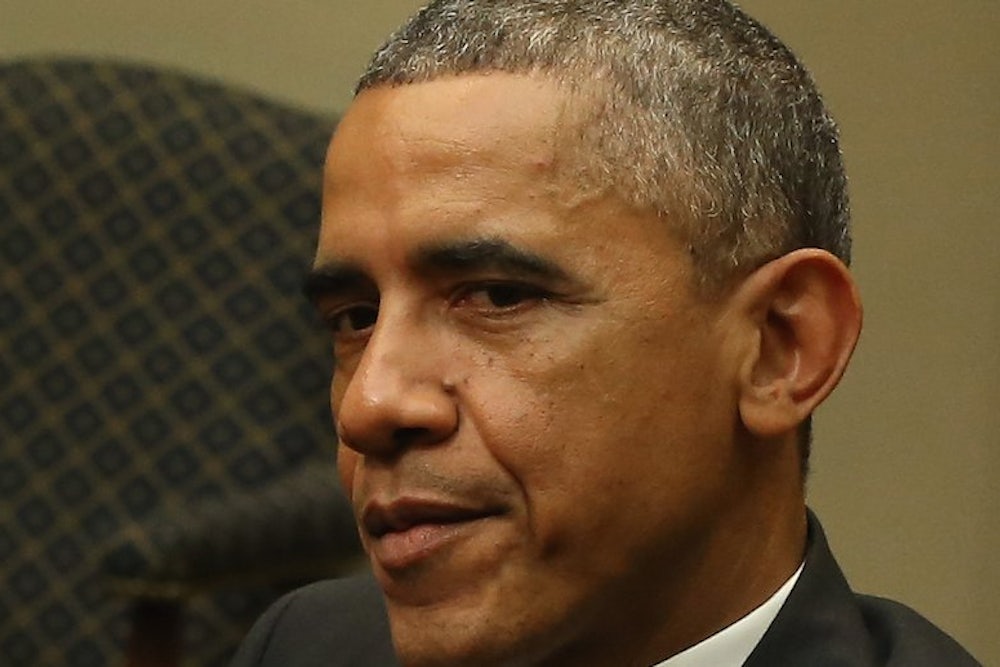When Republicans won a commanding midterm victory in 2010, President Obama decided, for multiple reasons, to accept the outcome as a blow to his own legitimacy. He conciliated Republican leaders. He adopted as his own the nominal goal of their economic agenda: deficit reduction. He set aside progressive tax increases, climate change mitigation, immigration reform—all the unfinished business of his first term.
This decision was a substantive disaster. It invited premature austerity, muzzled the economic recovery, and normalized, at least for a time, a cycle of legislative brinksmanship in which Republicans threatened to harm to the country—to shut down the government, withhold disaster relief, and default on the national debt—unless Obama agreed to more and more conservative policy objectives.
The concessions seemed then, and still seem to this day, like an error. But there was at least some logic to them. The Republican wave in 2010 was genuinely historic. In its wake, Obama had good reasons to wonder whether the voting public would still have his back if he resisted Republicans without giving their agenda a hearing. Counterfactuals are a tricky business, but as foolhardy as Obama’s 2011 strategy seems in hindsight, he and the Democrats recovered and won a satisfying victory in 2012.
None of that logic holds today. The past six years have given Obama no reason to believe Republicans are good faith bargaining partners. But even if they had, his political salvation, and the best interest of his allies isn’t in cutting conservative-leaning deals with the fully Republican Congress. It’s in the kind of partisan governing and campaigning he embraced after Republicans nearly sabotaged the economy in July 2011.
Republicans had an excellent night Tuesday. But they didn’t roar through the gates like they did in 2010. The argument that the 2014 Senate midterms, clustered heavily in the south and plains states, are a grand repudiation of a presidency that, while extremely productive, has been in check for four years, rings hollow.
So Obama isn’t facing the paradox of presidential democracy that confronted him in 2011. Moreover, he’s a lame duck now. A wistful and restless period probably awaits him. But he has no reason to concern himself with whether conciliation or combat is a wiser re-election strategy. His twinned political responsibilities now are cementing his own legacy, and shoring up his political base, so he can hand it off to the next leader of the Democratic Party. He can’t do that by undermining his own achievements and sidestepping the issues his core supporters care about.
And this is where Congressional Democrats’ reflexive tendency to recoil from Obama when he’s down will come into tension with their own best interests. Running away from Obama might—might—make sense for Southern Democrats running in a midterm. But in 2016, the Democratic nominee, and the Democrats riding her coattails, won’t have that luxury. Obama’s base is still vast and loyal, and won’t necessarily vote with the same enthusiasm for a Democratic Party that tries to pretend he and his presidency aren’t particularly relevant.
They will do best not to fracture on the assumption that the public just gave the hushed Republican policy agenda a vote of confidence, but to oppose it with confidence that when it’s laid against the Democratic agenda two year from now, the public will reject it. That means standing pat if and when Republicans try to slash taxes, weaken environmental regulations, damage Obamacare, and maximize the deportation of low-priority offenders. It means not voting in politically expedient ways and hiding behind Obama’s veto, but borrowing from Majority Leader-designate Mitch McConnell, who famously boasted that during Obama’s first term, Republicans “worked very hard to keep our fingerprints off [Democratic] proposals, because we thought—correctly, I think—that the only way the American people would know that a great debate was going on was if the measures were not bipartisan.”
That the new Democratic minority will be more liberal than the outgoing majority will make this task easier, as will the fact that the next Senate election will be nearly as daunting for Republicans as this one was for Democrats. Citing administration officials, Politico reports that “Obama’s political and policy teams are planning a big counterattack if the Republicans win the Senate—introducing a slate of legislative proposals and executive actions on immigration, infrastructure and early childhood education that are popular with the Democratic base and that he will dare the GOP to oppose.”
That’s a good start. It’s also the only decent play he has.
